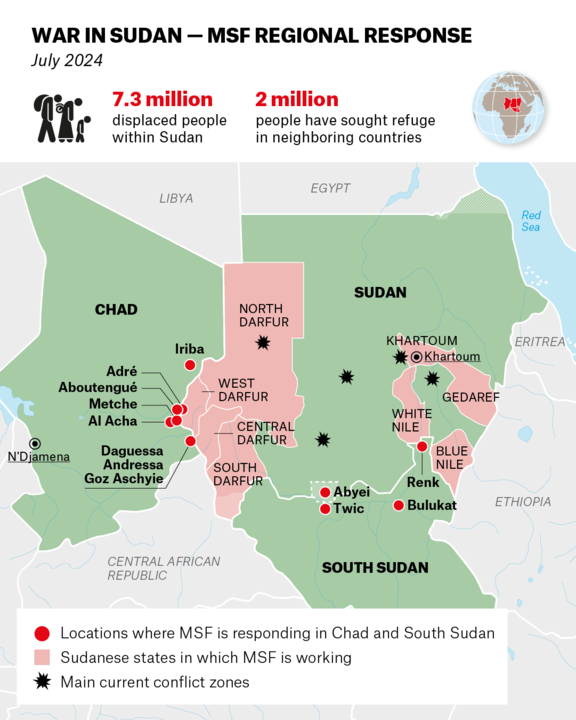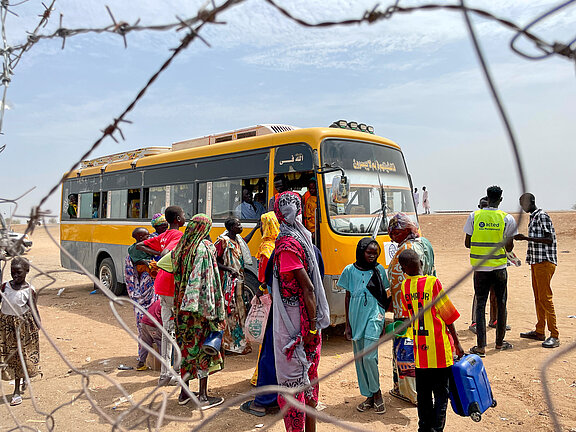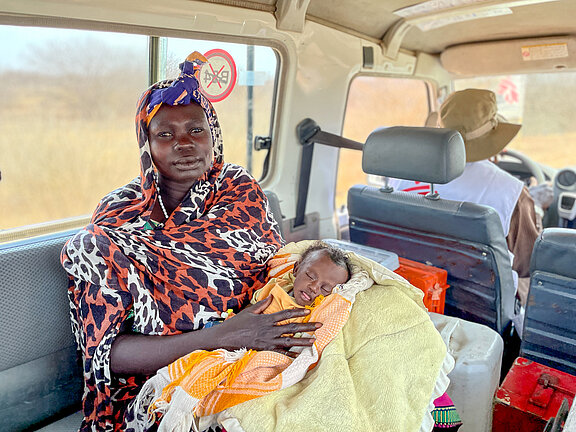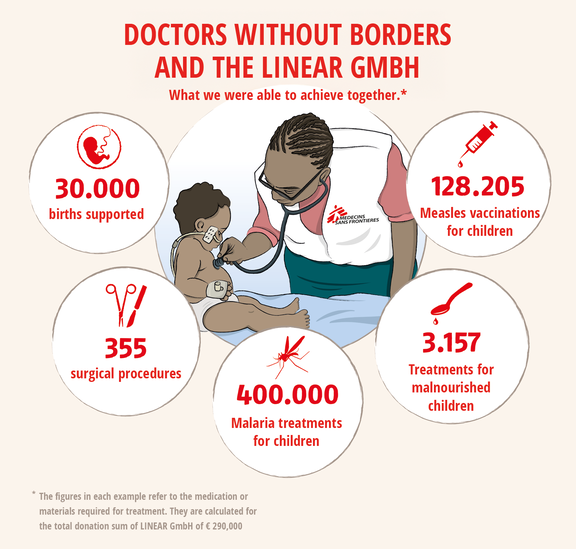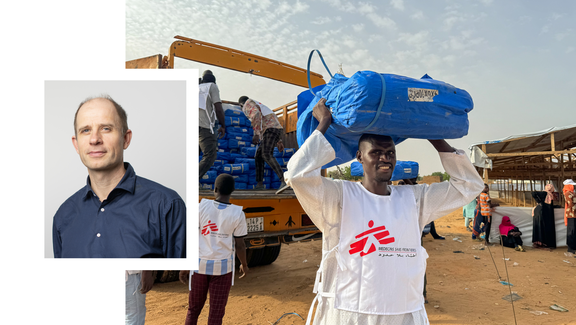
Photo 1: CHAD - Hundreds of thousands of people from the civil war-torn country of Sudan are living in refugee camps near the border town of Adré. A team from Médecins Sans Frontières unloads a lorry with relief supplies such as plastic sheeting, mosquito nets and soap. Photo: © Thibault Fendler/MSF
LINEAR: Mr. Katzer, you are a civil engineer. How did you come up with the idea of getting involved with Médecins Sans Frontières?
First of all, I would like to thank LINEAR for supporting our work with donations since 2017 - totalling almost 300,000 euros since then. It's not a matter of course that a company is so committed to helping people in need and is so socially engaged.
Now to my question: I already wanted to work in an international context while I was studying civil engineering. I am interested in other countries, I like travelling and I am curious. The company where I wanted to do my internship semester went bankrupt in the turmoil of the post-reunification years. So I had to find something new at short notice. With the support of the university and a small charitable organisation, I was able to work for an engineer in Guatemala and help build a primary school.
After my return, I was determined to continue working internationally. I stumbled across an advert from Médecins Sans Frontières, which advertised that they were also looking for people from non-medical professions. I applied, and my first assignment for the organisation took me to Liberia in 1999.
LINEAR: What did you experience there?
There was a civil war in the country. My job was to supervise the renovation and reconstruction work in three different hospitals where Médecins Sans Frontières was working. The first few weeks were classic construction management and supervision: tenders and contract negotiations alternated with visits to the construction sites, where - as on every construction site - there were always minor and major problems to solve.
After a short time, however, the civil war intensified and some of the hospitals had to be evacuated or were severely damaged in the fighting. As a result, my actual job was cancelled. At the same time, cholera broke out in the capital - there I was able to use my technical knowledge to help contain the disease. I also found this task very meaningful and fulfilling. As a result, I have repeatedly worked on projects with a logistical focus.
LINEAR: What logistical tasks are there at Doctors Without Borders?
Logisticians are responsible for the technical implementation of a medical project. They take care of everything that is essential for the operation of hospitals and smaller healthcare facilities: the technical equipment, the buildings themselves, the supply chain. In most cases, they are also responsible for implementing safety precautions. This is a very important task, especially in conflict regions.
LINEAR: What are the typical challenges?
Technical construction often takes place under great time pressure. For example, when many people are fleeing violence, a huge refugee camp forms at lightning speed, like a city in the middle of nowhere. The people there need drinking water, sewage systems, latrines, accommodation and medical facilities. Logisticians help with all of this. I myself have planned water pipes in projects, supervised the construction of latrines and provided electricity. Ultimately, there are many areas that are covered in theory during your studies as a civil engineer. However, the most important thing when working with MSF is that you learn to be flexible and react quickly to new problems.
LINEAR: Do you have an example of flexibility in action?
I like to remember a colleague who worked for us in a small clinic in the Central African Republic. We had employed him to sterilise the surgical instruments. However, this was not so easy due to the conditions on site: as we didn't have enough electricity, the instruments were heated in a kind of pressure cooker over a wood fire. In order to reach the required temperature, the fire had to be constantly supplied with fresh air. This colleague had built a crank from old bicycle parts such as pedals and a wheel, which operated a self-made fan via a belt. This meant he could always keep the fire at the right temperature without much effort. I find such constructive ideas very motivating.
LINEAR: Are there any current innovations at Médecins Sans Frontières that you can tell us about?
We have been increasingly focussing on our own CO2 footprint for some time now. There are various ways in which we can reduce it. With innovative approaches, we are focussing on the use of packaging, sustainable transport routes and waste disposal. These are not uncomplicated issues if we want to continue to work quickly, flexibly and in a standardised way.
I am happy to mention other examples: In the epidemiological field, i.e. in the prediction of disease outbreaks and their progression, we use artificial intelligence. In our office in Berlin, we are looking at the many possibilities of using 3D printers. In our projects, for example, they are already being used to produce hand orthoses or protective masks after facial burns.
We are also currently testing solar modules in Chad that generate enough electricity for a small health centre. This decentralised power supply is vital for the survival of many thousands of people from Sudan who have fled to safety in camps in eastern Chad. In Europe, however, we hardly notice anything about this crisis.
LINEAR: Can you tell us more about this?
People have fled from Sudan across the border into Chad because a brutal civil war has been raging in their homeland since April 2023. Bombs are falling every day, people are living in tents as they flee and have hardly any food. Every second person in Sudan is now dependent on humanitarian aid. It is very important to me that this crisis receives more attention. The people in Sudan and the neighbouring countries are in a truly desperate situation: many are emaciated, sick and malnourished - especially young children.
LINEAR: How does Médecins Sans Frontières help?
We have several aid projects in both Sudan and Chad. Since the outbreak of war and up to February 2024 alone, we have carried out more than half a million outpatient medical examinations in Sudan, for example. We provide drinking water in the refugee camps, treat malaria and much more. However, there is a need for many more organisations to get involved on the ground.
LINEAR: What can companies do to support your work?
Companies like LINEAR can of course donate money, perhaps even as a fundraising campaign together with their employees. This not only raises more donations - it also means that more people are informed about the situation in Sudan, for example. Companies can also use their public communication channels to raise awareness of the crisis in Sudan. Médecins Sans Frontières, for example, uses the hashtag
#TalkAboutSudan to raise awareness on social media.
It is crucial for us that sympathy for the needs in the world does not diminish. In recent years, for example, the war in Ukraine, the Covid-19 pandemic and the severe earthquakes in Turkey and Syria have been occasions when people have responded with great support. I would be very pleased if we can all continue to spark solidarity together in the face of the current major crises - such as the war in Gaza, Sudan or the increasingly tangible consequences of the climate crisis.
Thank you very much for the interview.
